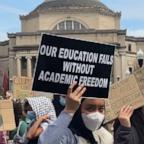Holbrooke: New Tactics to Break Afghan Stalemate
Afghan support for President Hamid Karzai weakens.
KABUL, Afghanistan, July 27, 2009 — -- U.S. Special Representative Richard Holbrooke outlined new tactics for the war in Afghanistan amid indications that war's long stalemate has weakened support for President Hamid Karzai in next month's election.
Holbrooke brings an aggressive approach to altering U.S. policy in Afghanistan, unafraid to blame the previous administration as much as decades of war for the country's woes.
"We're helping a nation get back on its feet after 30 horrible years, starting with the Soviet invasion, the Taliban era and, let me be honest, the period in the last few years. We made mistakes ourselves," Holbrooke told reporters during a visit to Ghazni province.
This article is the first in a series by ABCNews.com titled "The Fight For Afghanistan, Where We Stand." The series will take a closer look at the war in Afghanistan.
More than 7½ years after the war began, Afghanistan has never been more dangerous for U.S. troops. July was the deadliest month of the war for all foreign troops, and according to an ABC News poll taken earlier this year, Afghans are twice as pessimistic about the future of their country as they were in 2004.
"It's been a stalemate. Neither side was going to win," Holbrooke said in an interview when asked whether he agreed with those who declared the war a stalemate. "And that is not where you want American troops and those of our allies. So we're changing it."
This administration's most visual policy change was the deployment of more than 20,000 additional troops to southern Afghanistan, the first time the U.S. has committed large resources to the Taliban heartland.
For the latest news on the Taliban in Afghanistan click here.
Its most dramatic policy shift, however, may be a fundamental overhaul in how it treats the country's farmers. Eighty percent of working age males -- those who are also doing most of the fighting -- are farmers, and while the U.S. has spent tens of millions of dollars on agriculture policy, it also tried to eradicate poppy fields, the most profitable crop in the country.
For a full transcript of the interview with Holbrooke, click here.
"That turned farmers against us," Holbrooke said, giving them the impression that the U.S. was waging war against the Pashtuns, the ethnic group that forms the majority of Afghanistan and western Pakistan.
"We are not fighting the Pashtun people," Holbrooke told a group of religious elders. "We are trying to help the Pashtun people."




